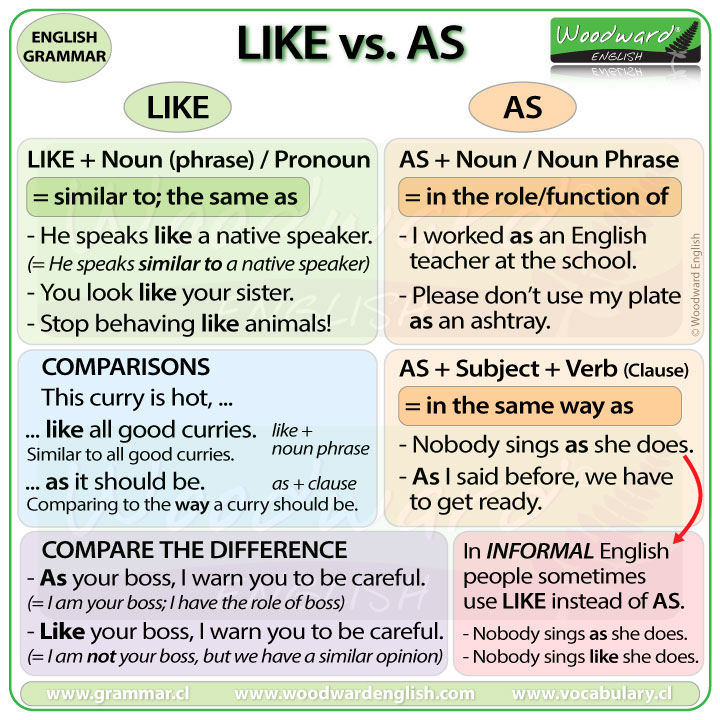There are many ways to incorporate the use of the word "like" in English. Lets have a look:
A/A
|
Use
|
Meaning
|
Example
|
1
|
Like +
ing or infintive
|
It shows a preference
in something
|
a)
I like going to the cinema
b)
I like to see all the latest movies
|
(!) When we use like with –ing,
we express a general preference.
When we use it with an infinitive
we express an idea that we have or
a regular action.
|
|||
2
|
Would like
|
We use it to make
polite offers
|
Would you like to have lunch next week?
|
3
|
Like used as “as if”
= “λες και”
|
It is used orally
and informally.
|
a)
I feel like
I am a princess.
b)
It was like
I was back in the sixties.
|
4
|
Like
= “Σαν”
= “πώς είναι ο χαρακτήρας κάποιου”
= “ τυπικό
παράδειγμα”
|
It is used as “similar/typical”
|
a)
Like me, you are probably a bit shocked.
b)
What is Harry like?
c)
You look like
you need to sit down.
d)
It is just like
him to be late.
|
5
|
Feel like
|
It means I have a
desire (πόθο) to do
something
|
I feel like going out for a meal.
|
(!) Like can be used with the adverbs quite / rather (αρκετά).
A) It is quite like the old times.
B) It is rather
like it was before
we had computers.
|
|||
Useful
phrases with “ like “
|
A/A
|
Phrase
|
Meaning
|
Example
|
|
1
|
Come when you like
|
Είσαι ευπρόσδεκτος οποτεδήποτε.
|
You are always welcome. Come when you like.
|
|
2
|
Do as you like
|
Κάνε ότι νομίζεις
|
It is entirely your choice. Do as you like.
|
|
3
|
If you like
|
Εάν θες.
|
We could go together, if you like.
|
|
4
|
Like this
|
Με αυτόν τον τρόπο
|
You out the paper in here like this.
|
|
5
|
Eat like a horse
|
Τρώω πολύ
|
Kate eats like a horse but she seems to never
put on weight.
|
|
6
|
Feel like a million
|
Αισθάνομαι όμορφα ψυχολογικά και εξωτερικά.
|
I have bought a new suit for work. I feel
like a million.
|
|
7
|
Go like clockwork
|
Όλα λειτουργούν ρολόι
|
The launch of the new product went like
clockwork.
|
|
8
|
Like a bat out of hell
|
μανιασμένα
|
He drove like a bat out of hell, I was scared.
|
|
9
|
Like a fish out of water
|
Αισθάνομαι έξω από τα νερά μου
|
He knows a lot about
accounting but he is like a fish out of water in marketing.
|
|
10
|
Sells like hot cakes
|
Μοσχοπουλάει
|
The new iphone sells
like hot cakes.
|
|
11
|
Out like a light
|
Σβήνω από την κούραση
|
He was so tired that
he went out like a light when he lay on the sofa.
|
|
12
|
Watch like a hawk (γεράκι)
|
Επιβλέπω κάποιον έντονα
|
During the test, the
examiner watched the candidates like a hawk to prevent any cheating.
|
|
13
|
Spreads like wild fire
|
Κάτι εξαπλώνεται σαν την φωτιά
|
Reports of their
argument spread like wild fire through the company.
|
Difference between “As” and “Like”
Εννοιολογικά: Η διαφορά μεταξύ των δύο έγκειται στο γεγονός ότι με
την χρήση του “as” υπογραμμίζουμε την λειτουργικότητα / ιδιότητα του ατόμου ή του αντικειμένου ή
δηλώνουμε ότι κάτι γίνεται με τον ίδιο τρόπο, ενώ με την
χρήση του “like” υπογραμμίζουμε μόνο την ομοιότητα.
e.g. He
works as (in the role
of/ με την ιδιότητα) a bank teller.
e.g. As I said before, we have
to get ready.
e.g. He
speaks like (similar to/σαν) a native speaker.
Συντακτικά:
Όταν θέλουμε να συγκρίνουμε τότε χρησιμοποιούμε το “as” με δευτερεύουσα
πρόταση (υποκείμενο+ρήμα+αντικείμενο) ενώ το “like” με ουσιαστικοποιημένη πρόταση.
e.g. Your
outfit for tonight is beautiful as
it should be.
e.g. My son
gets straight As like all good students.
Practise your understanding of the use of "like vs as" completing exercises in the following links:
https://www.usingenglish.com/quizzes/257.html
Good luck!



